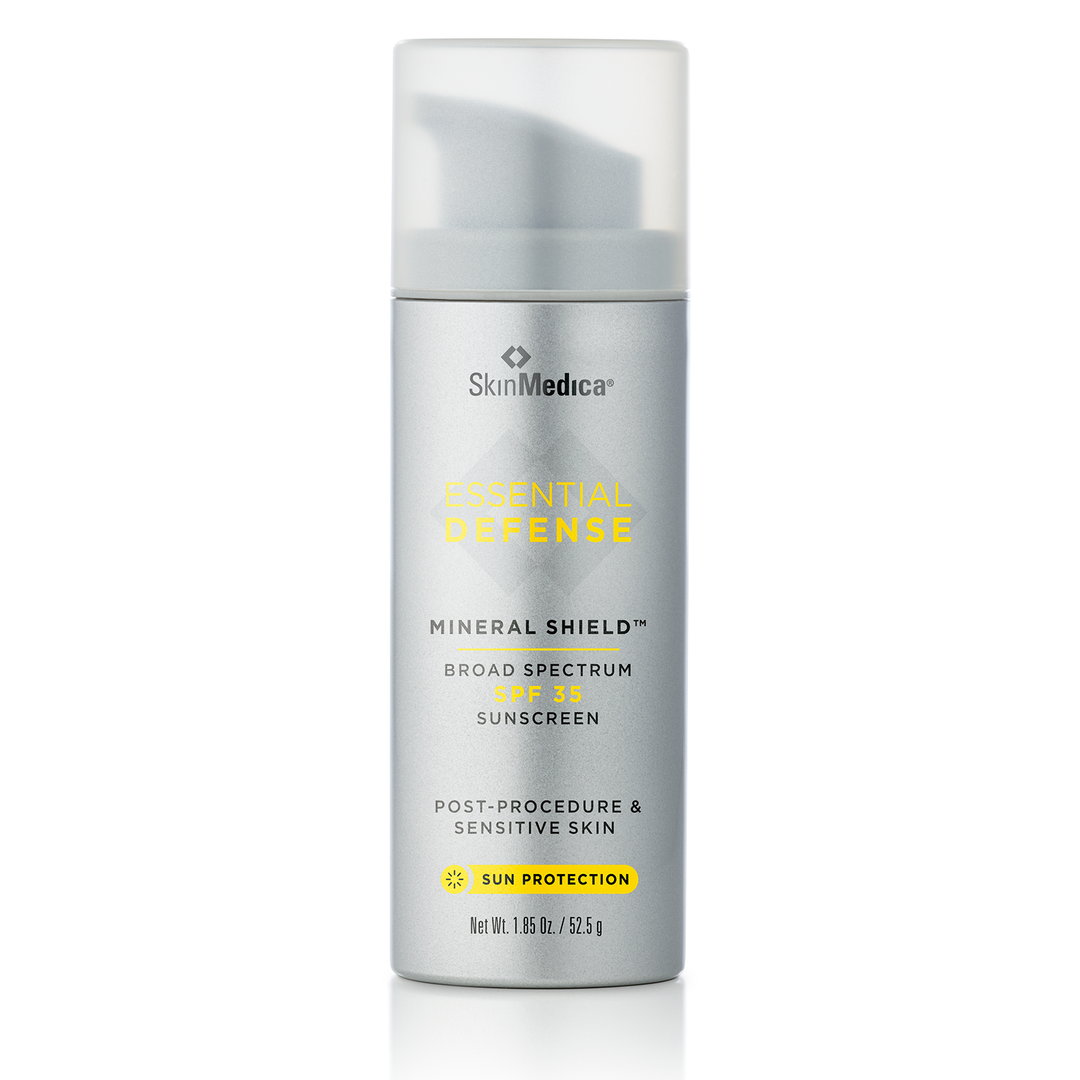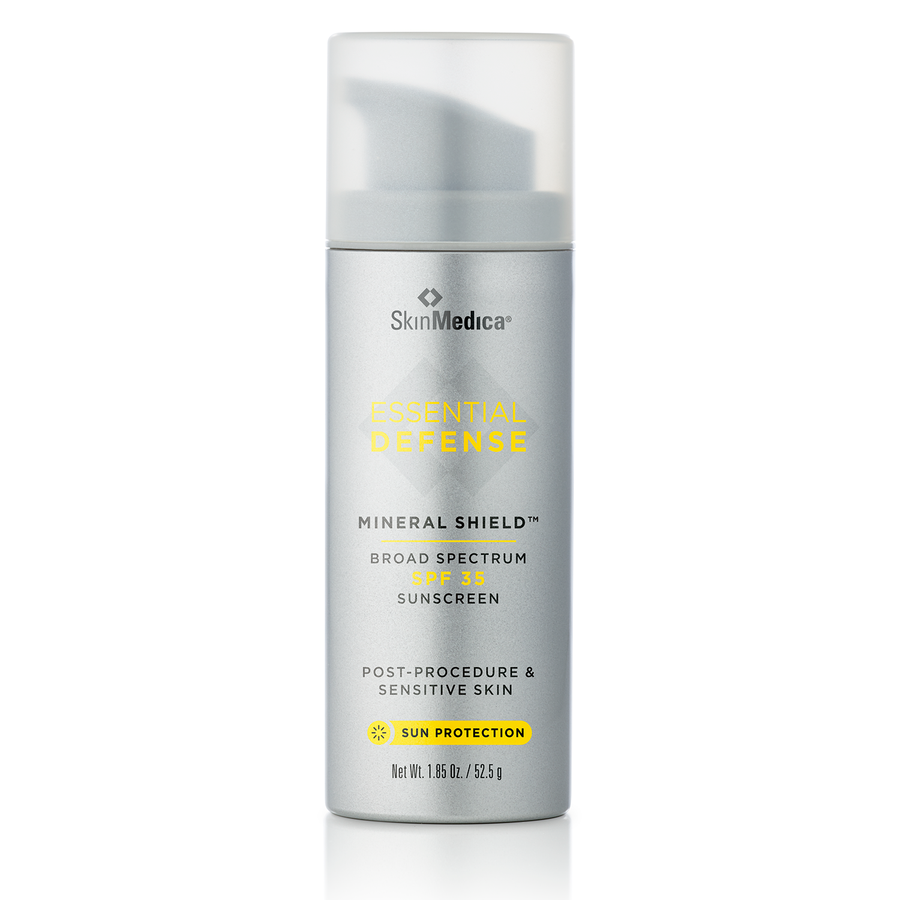
SkinMedica® Essential Defense Mineral Shield Broad Spectrum SPF 35
SkinMedica® Essential Defense Mineral Shield Broad Spectrum SPF 35
Appropriate for post procedure and sensitive skin types.
- Protects against damaging UVA and UVB rays.
- Will not clog pores.
- Paraben free, hypoallergenic, oil free, and fragrance free.
Apply in the morning after cleansing, toning, and application of treatment products. Apply to your entire face, (neck and chest if desired) and other sun-exposed areas. Apply liberally 15 minutes before sun exposure. Reapply at least every 2 hours.
Active Ingredients: Titanium dioxide 5.0% Zinc oxide 6.0%
Inactive Ingredients: Water, cyclopentasiloxane, dimethicone, polyglyceryl-3 polydimethylsiloxyethyl dimethicone, butylene glycol, aluminum hydroxide, dimethicone/peg-10/15 crosspolymer, peg-9 polydimethylsiloxyethyl dimethicone, sodium chloride, caffeine, camellia oleifera leaf extract, tocopheryl acetate, sodium citrate, dimethicone/vinyl dimethicone crosspolymer, triethoxysilylethyl polydimethylsiloxyethyl hexyl dimethicone, peg/ppg-18/18 dimethicone, triethoxycaprylylsilance, stearic acid, ethylhexylglycerin, phenoxyethanol, iron oxides (ci 77491, ci 77492, ci 77499)
What does a PA rating* mean?
PA rating refers to the amount of protection the sunscreen offers from UVA rays since SPF only ranks protection from UVB rays. The PA rating system ranges from +(least) to ++++(most). The more plus symbols, the more protection from UVA rays, the rays that may cause long-term skin damage and, therefore, age the skin. SkinMedica ® sunscreens have the highest PA rating at PA++++.
Do the Essential Defense sunscreens provide infrared (IR) protection?
No, only TOTAL DEFENSE + REPAIR delivers the breakthrough benefit of IR protection.
Do the Essential Defense sunscreens have both titanium dioxide and zinc oxide?
The two Mineral Shield Broad Spectrum Sunscreens contain both titanium dioxide and zinc oxide. Everyday Clear Broad Spectrum SPF 47 Sunscreen contains only zinc oxide.
How does the Essential Defense Mineral Shield Broad Spectrum SPF 32 Sunscreen Tinted work with darker skin types?
For those with darker skin tones who are more concerned about a whitening look from sunscreens, Essential Defense Mineral Shield Broad Spectrum SPF 32 Sunscreen Tinted may be a good option, depending on how dark the skin tone is. All three Essential Defense sunscreens can be an appropriate choice if no whitening is observed once each one is rubbed in. Sometimes the white coverage of zinc oxide and titanium dioxide found in traditional sunscreens can leave dark skin looking purple or blue, but since SkinMedica ® sunscreens use a micronized zinc oxide, they tend to be more sheer. The zinc oxide and titanium dioxide contained in SkinMedica ® sunscreens are embedded in a silicone matrix, which allows these minerals to spread evenly and smoothly on the skin without leaving the white residue typically seen with other sunscreens. *The UVAPF value provides information on the magnitude of UVA protection and helps determine the UVA classification of topical sunscreen products. In Japan, the PA rating system (PA+, PA++, PA+++, PA++++) is used to classify UVA protection. PA ratings are not a USFDA requirement on sunscreens sold in the US.
Are the Essential Defense sunscreens noncomedogenic, paraben free, hypoallergenic, oil free, and fragrance free?
Yes, all three Essential Defense sunscreens are noncomedogenic, paraben free, hypoallergenic, oil free, and fragrance free.
What does noncomedogenic mean?
Noncomedogenic means the product is not expected to clog pores.
What does hypoallergenic mean?
Hypoallergenic means it causes fewer allergic reactions than other products.
What is the difference between an all-physical sunscreen and a physical-chemical sunscreen?
An all-physical sunscreen utilizes sunscreen actives, such as titanium dioxide and zinc oxide, that work by sitting on top of the skin to deflect or block damaging UV rays away from the skin. A physical-chemical sunscreen utilizes a combination of sunscreen actives that include physical blockers and chemical filters to achieve a more elegant and sheer formulation. Chemical filtering sunscreen actives work by absorbing UV rays and converting them into heat energy on top of the skin.
When should you use an all-physical sunscreen vs when should you use a physical-chemical sunscreen?
An all-physical sunscreen is usually recommended by physicians for sensitive skin or following a procedure as directed by their physician. Physical sunscreens work better for people with heat-activated skin (ie, rosacea and redness) since they deflect the heat and energy from the sun.
What are the differences between TOTAL DEFENSE + REPAIR and Essential Defense?
TOTAL DEFENSE + REPAIR has been heavily researched and studied in clinical settings. It has published scientific data, Before & After photos, and clinical studies. More than a sunscreen, TOTAL DEFENSE + REPAIR goes beyond sun protection and actually helps support the skin's ability to restore itself.
